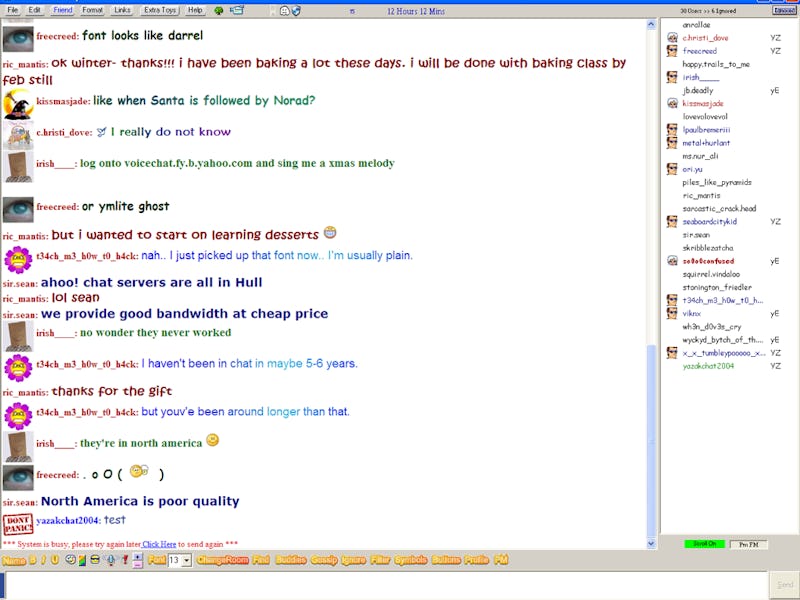Will the Future of Messaging End Up Being Yahoo! Chat?
As social media messaging services become more refined, they are looking more and more like an old classic.

Before smartphones — much less smartphone apps — were a thing, before Facebook and MySpace battled it out for which would become the highlander of social networks, before Snapchat or Twitter or Skype, there was a good five or six year period where Yahoo! Chat was the champion of social media.
Looking to meet new people? No worries, rooms were categorized by geographic location or interest (sometimes both) specifically to connect people. Looking for a little privacy for a small group? No worries, just a matter of starting your own chat room, setting it to private, and you had an invitation-only party. Looking for a little one-on-one time? Ping that special someone on the Yahoo! Messenger (formerly Yahoo! Pager) for a slightly more intimate conversation. The point is, between 1998 and 2004 — which is basically the internet equivalent of the Mesozoic Era — Yahoo Chat! was where all the cool internet kids hung out.
Only the real OGs remember the Yahoo! Pager
At the time — a time where you needed an actual scanner and a free hour or so (if you had a “high speed” 56k modem) to upload a picture — Yahoo Chat! served up what was cutting edge technology: custom fonts and text color, emojis, macros, audio soundboards, custom avatars, and even voice chat (in the later years). It played a safe middle ground, it was a bit more mature than AOL, while being less complicated (and much safer for novices) than more advanced IRC chat clients.
That’s not to say the old Yahoo Chat! was perfect by any stretch. When full, chatrooms tended to be a garbled stream of consciousness with messages flying in real time. Predators and harassment were just as real of a concern then as they are now on Twitter. Trolls there were just as annoying as they are on more modern social media sites and, perhaps, more so: One asshole with a spam macro could make a chatroom completely unusable.
Yet, if you look at the direction that social media — messaging in particular — is headed in 2016, there seems to be some pretty hefty borrowing from the old classics. Some of the seemingly desirable improvements being called for by users of today’s most popular messenger platforms tend to sound a lot like some of the features Yahoo! Chat offered two decades ago: simplicity, ease of use, and maybe most importantly, the ability to navigate between meeting new people and privacy.
Even though it’s billed as a micro-blogging platform, for many, Twitter was the sort of natural evolution of the chatroom, yet Twitter has two major problems where looking back might provide solutions: new user engagement and harassment. It’s not a secret that new users have a hard time cultivating their timelines unless they have pre-existing contacts to follow; they legitimately don’t know what to look for. Suppose Twitter introduced a method of filtering their “discovery” timeline by geography and/or interest in the same way chatrooms were organized? As far as harassment goes, imagine the difference being able to natively create a private sub-timeline would make; a function where you can choose not only whose tweets you see, but who could see your tweets while the particular filter was engaged.
If you've used both, you can see the influence of Yahoo! Chat on apps like Slack
Even the new kids on the block seem to be tacking back to basics. Slack is a fantastic app that has proven to have some pretty amazing social uses far outside of the business-related purposes for which it was created. In fact, Slack may very well be inadvertently changing the social messaging game. And while there still doesn’t seem to be very effective ways of navigating between groups, if you’ve had the chance to use both, it’s not hard to see Slack as sort of a final form of the Yahoo! Chat/Messenger app: a slicker interface, a ton of updated features, but at its core a solid, yet basic chat client.
Perhaps it’s nostalgia talking; maybe I’ve finally turned into the old guy in the digital barbershop preaching to the youngsters why the players of my generation were smarter, tougher, and better than the whippersnappers playing today. Or maybe internet communication might be as cyclical as something like fashion or music. Maybe there is no perfect messenger app, just the ebb and flow of preferences.